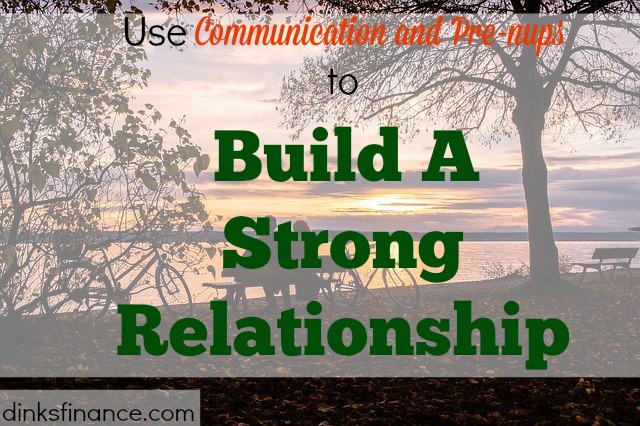Embarking upon a new relationship is a wonderful time in life – emotions are running high and you have ton of optimism about the future you will build together. The last thing you want to do is jeopardize your love by discussing mundane things like who brings home the bacon. But when you are getting together issues related to money are inevitably going to come up. Whether you are planning on getting married or just cohabitating, you might consider discussing the following questions:
1. Will you keep your finances separate and contribute only a specific amount to a joint checking account to pay for mutual household expenses?
2. If you establish a joint household account, will you contribute an equal amount or an amount proportionate to each person’s earnings?
3. Will you keep your retirement accounts separate at work but co-mingle mutual savings or investment accounts for things like a home or child’s education?
4. Will you maintain separate accounts for assets acquired before marriage? (Hint: if you never change title to an account acquired before marriage and do not add it during marriage, it’s less likely to be considered a marital asset).
5. Will you share your investment strategies so that your future investment plans are well balanced?
6. How would these agreements change if you had children, or a parental health crisis, and one of you had to take a temporary but unpaid leave of absence from work?
7. In the case of a second or third marriage, are you in agreement about how previous child support and spousal maintenance payments will be made? Are you willing to create an estate plan that provides for children of a previous marriage?
Take potential disagreements seriously and attempt to resolve them now. As sure as the sun rises in the morning, serious disagreements aren’t going to go away after you’ve been together for a while. Also, be prepared for some frustration and potentially long protracted negotiation. Even couples who strongly agree on finances and family questions can have very different perceptions about the significance and value of money. It can sometimes take a long time and an extensive series of negotiations to resolve these issues.
What about a prenuptial agreement?
A lot of people seem to feel that prenups take the romance out of marriage. The romance going out of marriage may happen eventually in any event – so it makes sense to plan ahead. Often when a marriage or relationship starts to unravel, agreements arrived at in advance can help mitigate some of the worse possible outcomes.
Also, prenups are good for removing the concerns that couples may have about getting married. For example, a while back I knew a guy who was interested in marrying a woman who was irresponsible with her money. My friend’s family figured this out pretty quickly while they were dating, and wouldn’t support the marriage unless the wife to be signed a prenup. They ended up signing and divorcing a few years later, which just goes to show you that a prenuptial agreement can help remove people’s concerns about getting married, even if the marriage may not be a good idea.
But, we digress…to get back on the topic. Each party in the prenuptial agreements should be represented separately by competent legal counsel when you are getting the agreement drawn up. Also you and your partner should reveal your true financial picture to set an open and honest tone to the negotiations to prevent later problems. A lot of people believe that what people don’t know doesn’t hurt them, but the reality is being dishonest or withholding information sets a poor tone for future negotiations and can lead to long term trust issues. In addition to raising issues of trust, failure to fully disclose your assets might be legal grounds for having the prenup voided in court.
Prenuptial agreements are highly flexible. They usually specify property to be divided. They can also set terms under which the couple’s assets will be divided and the financial terms under which the parties agree to live during the marriage. They do have some limitations; prenuptial agreements don’t usually cover arrangements about children and they are almost always constrained by State and Federal laws.
Finally, prenups should not be power plays where one partner seeks to dominate or exert his or her will over the other. A properly negotiated prenuptial agreement should be in the best interests of both parties and should solve problems ultimately leading to a stronger relationship. So, no matter what your circumstances, it is not unromantic to ask for one.
For more on this check out the following:
Bankrate.com’s write up of prenup basics
Our thoughts on prenups:
Prenups – better safe than sorry




I did not get a pre-nup 37 years ago. (Hubby and I are still together.) I don’t think they even existed back then. But today, I think I would now if , heaven forbid, the occasion arose. I have an inheritance I’d want to protect for my son. I do wish he had gotten one to protect future inheritance as well as retirement.. I firmly believe that each person should have his or her own retirement fund without taking part of the spouse’s in a divorce. Many people don’t know how badly a retirement or pension fund can be devastated is carved up in a divorce. I almost wish that pre-nups were legal requirements before marriage, just like a marriage license. That would take the sting out of being asked to sign one. It’s not really a romantic request which is why most people who should have one, don’t.
I can only agree, a hundred and one percent about romance going away after sometime. That said, might as well agree on a pre-nup that is spot on mutually beneficial. Truth be told, my 22-year marriage ended because of unending money issues. Ex-hubby and I just got so sick about it. Money can really ruin relationships and if pre-nup will assure both sides that money will not get in the way of the relationship, I’m all for it.
Jen and Kathy,
For what its worth noting that negotiating a pre-nup can be difficult but provided its done properly the process can be worth the time.
Best,
James